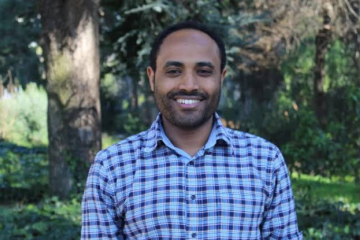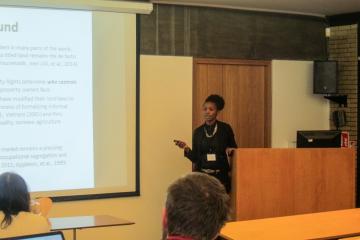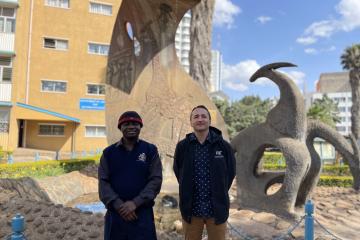Programme pour les chercheurs africains de J-PAL
Le Programme pour les chercheurs africains offre des financements, un programme de mentorat et des formations aux chercheurs africains. Le programme est actuellement proposé dans le cadre de trois des initiatives de J-PAL—JOI, DigiFI, DAISI—ce qui signifie que les chercheurs peuvent demander un financement dans ces domaines.
À propos du Programme
Le programme pour les chercheurs africains offre plusieurs type d’opportunités aux chercheurs africains.
Financement
- Subvention pour l’élaboration d’une proposition de recherche (jusqu’à 10 000 $)
- Subvention d’un pilote (jusqu’à 75 000 $)
- Systèmes de suivi et de monitorage (jusqu’à 75 000 $) [DigiFI uniquement]
- Évaluations randomisées (jusqu’à 400 000 $)
Pour plus d’informations sur chacune de ces possibilités de financement, veuillez consulter notre FAQ pour les chercheurs africains (African Scholar FAQs).
Support durant le processus de soumission et mentorat
Au cours de la procédure de soumission des demandes, le personnel de J-PAL est disponible pour fournir aux équipes de chercheurs africains des conseils sur leurs propositions de projets. Pour les chercheurs qui reçoivent un financement, un mentorat ciblé par un affilié de J-PAL ou un chercheur invité est organisé dans le but d’apporter des conseils pratiques sur la conduite de la recherche et le modèle de randomisation. Les chercheurs applicants peuvent soit identifier un mentor possible avant de soumettre une proposition, soit être mis en relation avec un mentor par le personnel de J-PAL après que leur proposition a été sélectionnée. Il n’est pas nécessaire d’avoir une relation existante avec un mentor pour postuler.
Formations et ateliers
Tout au long de l’année, le personnel de J-PAL Afrique organise des sessions d’information, des ateliers et des formations. En 2020, DigiFI a organisé une série d’ateliers virtuels en anglais qui couvrent certains des principes fondamentaux de l’exécution d’évaluations randomisées, dont les enregistrements sont disponibles sur cette page. JOI a organisé un webinaire à l’occasion du lancement de son appel d’offres du printemps 2022, sur le programme de recherche de JOI et les possibilités de financement pour les chercheurs africains. Pour obtenir des informations sur nos futurs événements, veuillez vous inscrire dans notre Registre.
Critères d'éligibilité
Deux catégories de chercheurs africains peuvent bénéficier d’un financement et d’un soutien dans le cadre de nos programmes :
- Les chercheurs africains résidents ont obtenu un Doctorat en Économie ou dans un domaine connexe et sont basés dans un établissement universitaire africain.
- Les chercheurs africains non résidents ont terminé leurs études secondaires en Afrique, sont titulaires d’un Doctorat en Économie ou dans un domaine connexe et sont basés dans un établissement universitaire hors du continent Africain.
DigiFI finance des chercheurs africains à la fois résidents et non-résidents, tandis que JOI et DAISI ne financent que des résidents africains basés en Afrique sub-saharienne. Notez qu’un seul membre d’une équipe de recherche doit répondre aux critères d'éligibilité pour que l’équipe puisse bénéficier d’un financement.
Funding
- Formative research: Proposal development grant (up to $10,000)
- Formative research: Pilot grant (up to $75,000)
- Monitoring systems (up to $75,000) [DigiFI only]
- Full randomised evaluations (up to $400,000)
For more information on each of these funding opportunities, please see our African Scholar FAQs.
Eligibility
Two categories of African Scholars are eligible to receive funding and support under our programs:
- Resident African Scholars include those who have completed a PhD in economics or related field and are based at an African academic institution.
- Non-resident African Scholars include those who completed high school in Africa, have a PhD in economics or related field, and are based at an academic institution outside of Africa.
DigiFI and HPI fund both resident and non-resident African Scholars while CVI, DAISI, JOI, and LAI only fund resident African Scholars based in Sub-Saharan Africa. Note that only one member of a research team has to meet the definition of African Scholar for the team to be eligible for funding.
Application support and mentorship
During the application process, J-PAL staff are available to provide African Scholar teams with light-touch assistance on their proposals. For Scholars who receive funding, targeted mentorship by a J-PAL affiliate or invited researcher will be provided. African Scholars may either identify an eligible mentor before submitting a proposal or be matched with a mentor by J-PAL staff after their proposal has been selected. It is not necessary to have an existing relationship with a mentor in order to apply.
Webinars and workshops
Throughout the year, J-PAL Africa staff run webinars and workshops on topics such as supporting the development of proposals for various initiatives and providing a platform for Scholars to share their work.
For example, DigiFI hosted a four-part webinar series that covers some of the fundamentals of running randomised evaluations that can be found on this page and JOI hosted a webinar at the launch of their Spring 2022 RFP on JOI's research agenda and funding opportunities for African Scholars.
To receive updates on future events, please register in our African Scholars database.
Resources
J-PAL has started a video series for Scholars on a wide range of topics, from how to make your funding applications more competitive to practical tips for running successful randomized evaluations
- How to write a competitive grant proposal video and guide
- Budgeting for a randomized evaluation guide
- How to build effective implementing partner relationships guide
More videos and guides will be released in the next couple of months
Domaines de recherche
Actuellement, trois des initiatives de J-PAL proposent un programme pour les chercheurs africains, et chacune a un agenda de recherche spécifique :
Digital Identification and Finance Initiative in Africa (DigiFI Africa)
DigiFI aims to generate rigorous evidence on how African governments, private companies, and NGOs can leverage digital payments and identification systems to improve lives through better public service delivery, governance, and financial inclusion.
For more information on African Scholars opportunities at DigiFi please click here.
Jobs and Opportunity Initiative (JOI)
Digital Agricultural Innovations and Services Initiative (DAISI)
DAISI aims to generate a rigorous evidence base that carefully identifies whether digital tools and bundled approaches are successful in improving smallholder farmer outcomes, connecting farmers to markets, and expanding commercialization in sub-Saharan Africa and South Asia.
For more information on African Scholars opportunities at DAISI, please click here.
Learning for All Initiative (LAI)
LAI aims to generate a body of policy-relevant rigorous research to improve student learning outcomes by addressing foundational literacy and numeracy, pedagogy, holistic skills, and barriers to equity and inclusion, particularly for girls.
For more information on African Scholars opportunities at LAI, please click here.
Humanitarian Protection Initiative (HPI)
HPI aims to fill gaps in research and equip humanitarian actors with a greater understanding of cost-effective, scalable, and context-sensitive solutions to prevent and remedy physical, psychological, social, and legal harm against conflict-affected populations.
For more information on African Scholars opportunities at HPI please click here.
Vous trouverez de plus amples informations sur le Programme pour les chercheurs africains dans notre FAQ (African Scholars FAQs).
Spotlight series
Projets financés
A ce jour, J-PAL a financé 30 projets de chercheurs africains dans 11 pays du continent (Bénin, Ethiopie, Ghana, Kenya, Malawi, Nigeria, Ouganda, RFD, Sénégal, Tanzanie et Afrique du Sud).

Ci-dessous est la liste complète de ces projets, groupés par initiative.
Jobs and Opportunities Initiative (JOI)
- Adoption of Improved Cook Stoves and Women's Decision-making Empowerment in Rural Benin
-
Can Speed Dating Initiatives Lead to Better Employment Opportunities in Malawi?
-
Enabling Entrepreneurs: An Impact Evaluation of a Business Incubator Development Programme in Uganda
-
Enhancing the enterprise development capacity of SMMEs: Evaluating the impact of Phaphama SEDI
-
Impact of Quality Childcare Services on Women’s Empowerment in Senegal
-
Short term Apprenticeship Training and Labour Market Outcomes: Experimental Evidence from Ghana
-
Supported Childcare and Female Labor Market Participation in East Africa
-
Which design features of the AJIRA Kenya have the most impact?
Digital Identification and Finance Initiative (DigiFI)
- Assessing the effect of digital and flexible payment options on the uptake of health insurance by the Nigerian informal sector
- Biometric tracking of health workers attendance and maternal and child health outcomes in rural Nigeria
- Biometric Tracking of School Attendance and Human Capital Formation of Pupils: Evidence from Rural Schools in Nigeria
- Digital Identification Systems, Digital Financial Services and Household Welfare in Ghana
- Digital Transformation and Competition: Evidence from Mobile Money
- Improving Ghana’s National Health Insurance Biometric Card Renewals: A Randomised Control Trial Using Reminders and Moving Renewal Dates
- Improving the supply of mobile money towards better financial inclusion: The case of Democratic Republic of the Congo
- Introduction to the “m-tax” mobile payment platform in Senegal: A formative evaluation of the reform
- Leveraging digital finance in Ethiopia: Pilot Study
- Leveraging National Identification and Digital Payment Systems to Nudge Informal Pension Contributions in Ghana
- Rural Households' Enrolment in Digital Identification and Payment Systems
- Smart Together: Advancing targeted digital financing and group managment dynamics for inclusive agricultural productivity and prosperity in Nigeria
- The Impact of Biometric Identification Technology Use on Employee Attendance and Payroll Management: Experimental Evidence From Ethiopia Public Service Sector
- The Role of Digital Finance Platforms in Managing the Fiscal Space and Enhancing the Efficiency of Tax Collection and Administration at Subnational Levels in Nigeria
- Community Water and Sanitation Agency Smart Taps in Northern Ghana
- Digitalization of Cocoa Value Chain Payments in Ghana
- Linking mobile money to formal savings account: Experimental evidence from small-scale women agri-processors in Burkina Faso.
- Digital Payment Solution to Incentivize Rural Health Extension Workers in Ethiopia
- Cash and Compliance with Social Distancing
- Using digital payments to catalyze tax collection in The Gambia
- Increasing mobile banking use among rural populations in Ghana
- Improving health insurance take-up among informal workers: evidence from Nigeria
- Digitization Effects in Equilibrium
- Saving for Insurance: Using Electronic Wallets on Mobile Phones to Collect Insurance Premiums
Digital Agricultural Innovations and Services Initiative (DAISI)
- Efficiency of digital agricultural services by Cowtribe, Ghana
- Digital Climate Change Adaptation Services for Sustainable Agricultural Productivity in Nigeria
- Gendered Impacts of Individual and Bundled Services on Agricultural and Farmer Outcomes in Benin
- Digital Personalized Agricultural Advisory Service, Output Market Access and Smallholder Farmers Performance in Nigeria
- Can personalised digital solutions improve smallholder farmer outcomes in Ghana?
- Improving livestock production through tracking devices in Northern Ghana
- The Agribroom App: Piloting targeted bundled digital agricultural technology for inclusive agricultural productivity
Learning for All Initiative (LAI)
- Closing Information Gap to Improve Student Attendance and Learning Outcomes in Primary School in Tanzania
-
Play-based learning intervention for Early Childhood Development in rural Tanzania
-
Exploring Digital Learning Product for Early Years Foundational Stage Learners in Nigeria
-
Empowering Displaced Children through Innovative Education Interventions: A Study in Ethiopia















